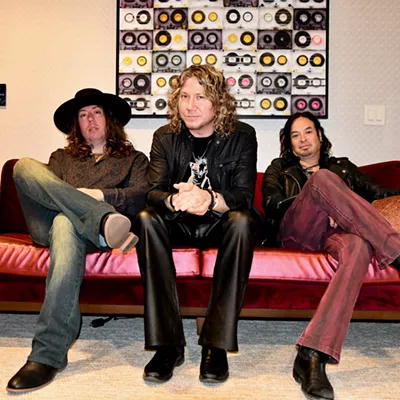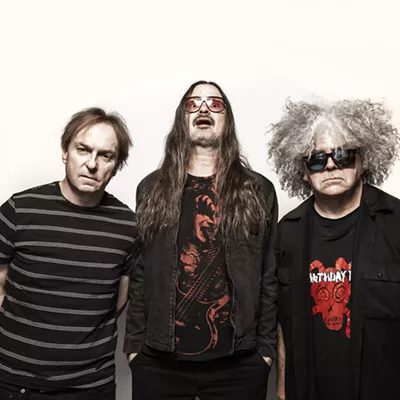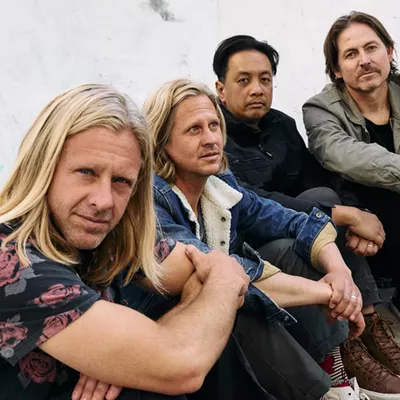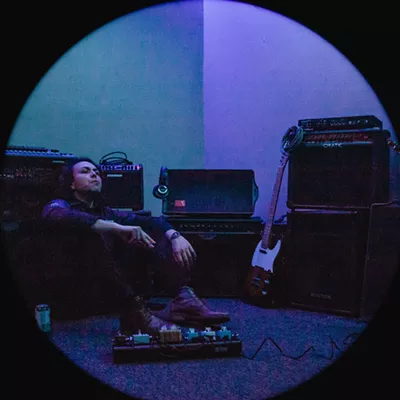The first FUZZ record was a challenge. The second is about freedom, exploration and instinct.
When garage rockers Charles Moothart and Ty Segall set out to make a new band in the mold of classic heavy rock, they produced a debut album full of big buzzsaw riffs, bluesy-psychedelia and dizzying jams. Having met that challenge, FUZZ brought in a new bass player in Chad Ubovich and stretched their limits on the follow-up.
"The whole idea of the band started as a personal challenge," says guitarist Moothart. "We've all always been into Black Sabbath and the classic heavy bands like that. In the back of our heads there was always this element of wanting to try to play music like that."
"At that time, I was more into Hawkwind and Blue Cheer, these different bands that were opening up new ideas for me. I don't really feel like we were trying super hard to be a specific thing. I've never wanted to have it called just one genre. I love stoner rock, but I don't identify it as just that. I don't like tying it down to just one idea," he says. "I just wanted to see if I could write a song or a riff that held up in that genre of music. I brought it to Ty and he was stoked on it and we just started to jam, so it's always been how far can we push our abilities in this and how free can we keep the whole thing? We always wanted it to have an open-ended factor and we definitely explored that more on this album."
With the release of II this month, FUZZ put to rest any notion that the band was merely a side venture. Even though Segall (in this instance on drums) has seen his star rise even more since FUZZ's 2013 debut, the proto-metal of II is a creative leap that captures FUZZ pushing their own boundaries.
"We all like so many different kinds of music, I don't think it ever would've been in us to stick with one thing," Moothart says. "I think we have the same approach to all the music we do. It's just a matter of expressing something we want to express at that time."
The guiding idea for II became longer songs, extended jamming, more unexpected detours and a conscious effort at subverting the formula that FUZZ so expertly brought to the first record.
"The aesthetic difference is big, but at the same time we never want to pigeon hole ourselves into a specific thing. Everything we do falls under the same ethos of keeping things different and not repeating ourselves," Moothart says. "We didn't want to do the same thing twice and we had the comfort of having one under our belt."
FUZZ started getting together to write and rehearse in January, jamming several times a week as the songs started coming together. Each bandmate brought in ideas to start with, either loosely formed songs or just single riffs.
"There are a handful where I had a pretty solid idea what I wanted to happen. There are others we straight up jammed on and saw where they went. Some of the best songs and some of the best ideas usually come when you can break something apart and try to fit it somewhere else," Moothart says. "On this record, Ty brought one of the songs that was going to be one of his solo songs and he couldn't make it work the way he wanted to for his stuff, so he brought this riff and we started playing it and it ended up being a really rad song. We tweaked it around and it worked for us."
The songs on II—like "Rat Race," "Burning Wreath" and "New Flesh" present another nod to the conventions of metal, while also putting the band's own personality on display.
"I don't think we had any grand idea of trying to dive into specific subject matter. But you can't deny that sonically certain things lend themselves to certain subject matter. You can't escape that. 'Jack the Maggot' for instance, we had this song and didn't know what the lyrics should be. Ty had this thing written down in his phone, this rambling weird, totally off-the-wall, stream-of-consciousness thing," Moothart says.
Similarly, the album title itself is in line with bands like Led Zeppelin that presented their records as volumes of an individual body of work.
"That's definitely a classic move. It's also one more thing you don't have to worry about. It also makes things separate and you're not going to go into it with specific ideas. It's just 'Here's the second one,' so it lets you go into it with an open mind," he says.
Moothart says FUZZ wants to take the momentum created by II and get back to a new album sooner rather than later.
"We definitely don't want to wait as long as we did to do another FUZZ record, but we all have a lot of things going on. We'll continue on and do whatever comes our way," he says.
And whether having far surpassed their original goal of writing in the mode of classic heavy bands, FUZZ is excited to explore even more of the heavy realm as they carve out a distinct identity.
"Sonically, when you take any band out of any genre, the best aren't trying to sound like anything," he says. "It's all about going in and just trying to do your own thing."












